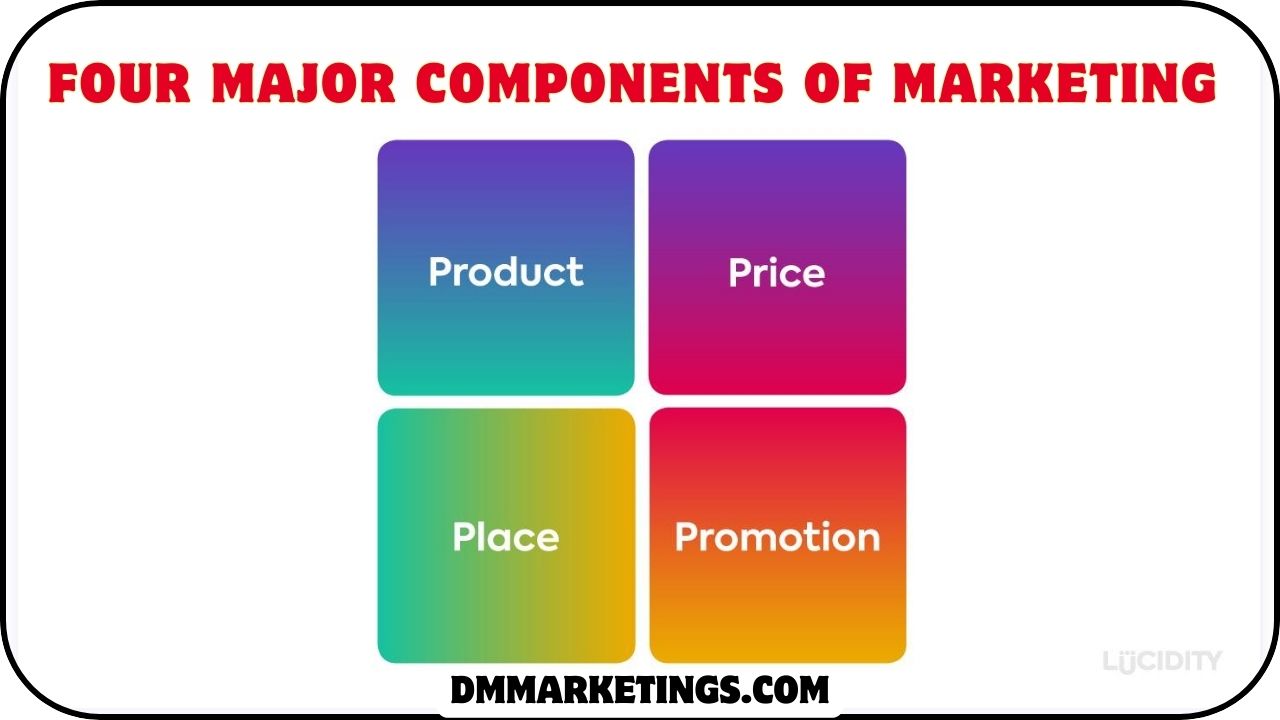In the fast-paced world of 2024, marketing has undergone a profound transformation, driven by technological advancements and shifting consumer behaviors. Understanding the four major components of marketing is crucial for businesses aiming to stay ahead in this dynamic landscape.
four major components of marketing
A. Definition of Marketing
Marketing, at its core, is the process of promoting and selling products or services. In 2024, it encompasses a diverse range of strategies and channels, reflecting the ever-evolving nature of consumer interactions.
B. Significance of Marketing in 2024
In an era dominated by information and choice, effective marketing is the linchpin for brand visibility and success. The digital age has brought forth new challenges and opportunities, making it imperative for businesses to adapt.
II. Traditional Marketing
A. Print and Broadcast Media
While digital platforms have surged in prominence, traditional marketing methods like print and broadcast media continue to play a role. Establishing a balance between traditional and digital strategies is essential for comprehensive outreach.
B. Direct Mail Marketing
Direct mail, once considered antiquated, has found resurgence in targeted campaigns. Personalized and well-crafted direct mail can cut through the digital noise, reaching the audience in a tangible and impactful way.
III. Digital Marketing
A. Social Media Marketing
Social media platforms are the bustling marketplaces of the digital age. Leveraging these platforms strategically allows businesses to connect with their audience, build brand loyalty, and stay top-of-mind.
B. Search Engine Optimization (SEO)
SEO remains a cornerstone of digital marketing. Optimizing online content for search engines ensures visibility in an overcrowded online space, driving organic traffic and enhancing brand credibility.
C. Content Marketing
Engaging and valuable content is the currency of the internet. Content marketing involves creating and distributing relevant content to attract and retain a target audience, fostering trust and brand affinity.
IV. Data-Driven Marketing
A. Importance of Data in Marketing
In 2024, data is the lifeblood of marketing strategies. Analyzing consumer data allows businesses to understand preferences, tailor campaigns, and deliver personalized experiences, ultimately driving conversions.
B. Predictive Analytics
Predictive analytics takes data analysis a step further, forecasting future trends and consumer behaviors. Marketers can make informed decisions and anticipate market shifts, gaining a competitive edge.
V. Customer-Centric Marketing
A. Personalization Strategies
Consumers now expect personalized experiences. Implementing personalization strategies, such as targeted messaging and customized recommendations, enhances customer satisfaction and loyalty.
B. Customer Feedback and Reviews
Authentic customer feedback and reviews are potent tools in modern marketing. Positive reviews build credibility, while constructive criticism offers valuable insights for improvement.
VI. Emerging Trends in Marketing
A. Artificial Intelligence in Marketing
AI-driven technologies automate processes, analyze vast datasets, and enhance customer interactions. Implementing AI in marketing streamlines operations and enables data-driven decision-making.
B. Virtual and Augmented Reality
Virtual and augmented reality provide immersive experiences. Marketing campaigns utilizing these technologies create memorable interactions, leaving a lasting impression on consumers.
C. Voice Search Optimization
As voice-activated devices become ubiquitous, optimizing content for voice search is paramount. Businesses must adapt their SEO strategies to accommodate the rise of voice-based interactions.
VII. Integration of Marketing Components
A. Holistic Marketing Approach
Successful marketing in 2024 requires a holistic approach, integrating traditional and digital methods seamlessly. Consistency across channels enhances brand identity and fosters consumer trust.
B. Cross-Channel Marketing Strategies
Cross-channel marketing ensures a cohesive brand presence across various platforms. Coordinating messages and campaigns across channels creates a unified customer experience.
VIII. Challenges in 2024 Marketing
A. Privacy Concerns
Heightened awareness of data privacy has led to consumer skepticism. Navigating privacy concerns requires transparent practices and ethical use of customer information.
B. Adapting to Rapid Technological Changes
The pace of technological innovation poses a challenge for marketers. Staying informed and agile in adopting new technologies is essential to remain competitive.
IX. Marketing Metrics and Measurement
A. Key Performance Indicators (KPIs)
Identifying and tracking KPIs provides insights into the effectiveness of marketing efforts. Metrics such as conversion rates, engagement, and ROI guide strategic decisions.
B. Analytics Tools
Sophisticated analytics tools empower marketers to make data-driven decisions. Investing in the right tools enhances efficiency and allows for a more nuanced understanding of consumer behavior.
X. Future Outlook of Marketing
A. Evolving Landscape
The marketing landscape will continue to evolve, influenced by technological advancements, societal changes, and consumer preferences. Businesses must stay adaptable to thrive in this dynamic environment.
B. Anticipated Innovations
Anticipated innovations, such as augmented reality advertising and advanced AI applications, will redefine marketing strategies. Forward-thinking businesses will leverage these innovations for a competitive edge.
XI. Conclusion
In conclusion, the four major components of marketing in 2024 will encompass traditional methods, digital strategies, data-driven approaches, and customer-centric practices. Businesses that embrace a holistic and adaptive marketing strategy are poised for success in an ever-changing landscape.
XII. FAQs
A. How has marketing evolved in 2024?
Marketing in 2024 has evolved to embrace a diverse range of traditional and digital strategies, with a strong focus on data-driven decision-making and customer-centric practices.
B. What role does data play in modern marketing?
Data is integral to modern marketing, guiding personalized campaigns, predicting trends through analytics, and enhancing overall strategy effectiveness.
C. Are traditional marketing methods still effective?
Traditional marketing methods, when integrated strategically with digital approaches, can still be effective in reaching specific target audiences and creating a well-rounded marketing strategy.
D. How can businesses overcome privacy concerns in marketing?
Businesses can overcome privacy concerns by adopting transparent practices, obtaining explicit consent, and prioritizing ethical use of consumer data.
E. What are the key challenges marketers face in 2024?
Marketers in 2024 face challenges such as navigating privacy concerns, adapting to rapid technological changes, and staying ahead of evolving consumer expectations.
